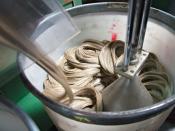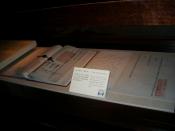In the early days of the eighteenth century the British following venturesome Portuguese, Dutch, and Spanish had established a trading base at Canton where they soon outstripped in activity their European competitors. From the beginning trade was restricted by regulations devised by the Chinese to keep the foreigners at arm's length, yet permitting the Chinese to continue to export their teas and silks and to receive desired British goods. The export of Chinese commodities far exceeded the imports of British goods and this resulted in an adverse cash balance to the British traders. Initially these debits had been discharged by silver payments but by the close of the nineteenth century there was a found new commodities that balanced the books and ultimately provoked a war, that commodity was opium.
In October 1838 Lin Tse-hsu was summoned to Imperial Palace in Peking, where the Emperor personally assigned him to stamp out opium addiction in China.
Lin accepted his assignment and soon launched his anti drug campaign in Canton where he set up headquarters and took command of the local naval forces. Soon after that Lin proclaimed that the opium trade would no longer be tolerated in Canton and he began arresting known opium dealers in the local school and naval barracks. Those found guilty of purchasing, possessing or selling opium were sentenced to public execution by strangulation. "Let no one think" Lin proclaimed, "that this is only a temporary effort in behalf of the Emperor. On March 1839 Commissioner Lin gave the opium smugglers a demonstrations of the seriousness of his intent. He ordered the suspension of all trade with the western merchants. Troops surrounded the foreign neighborhood, building barricades across the streets to prevent the Chinese patrol ships lined up in the river opposite the trading houses. The ranking British Naval officer in the Chinese port, Captain Charles Elliot, protested Lin's action. Shortly after the barricades were erected Lin and his troops began the methodical destruction of the opium, or "foreign mud".
On August 31, Commissioner Lin learned that a twenty-eight gun British frigate had joined the merchant ships anchored off Hong Kong. Although this news was not good, Lin, who had the use of a fleet of Chinese way junks at his disposal, was not frightened by the arrival of a single British warship and he assumed that the Chinese warships were superior to the ships of the British navy. He thought that Europeans were primitive barbarians. Finally, on September 4, two British merchant ships and a launch from the newly arrived warships attacked three Chinese junks that tried to prevent them from landing at Kowloon to obtain water and supplies. The Chinese warships did returned British fire, they did no damage to the British ships, and were forced to retreat after being badly shot by cannonballs. The scene was repeated innumerable times at ports up and down the China coast in the 1830's. It was not long before the foreign mud became the reason for the Opium War between Great Britain and China.
The Foreign Minister, Lord Palmerston prepared to debate the strained Chinese situation in Parliament. Palmerston, under the tutelage of Willliam Jardine, the greatest and most influential of the opium smugglers expressed a desire that the China market remain open and that he was prepared to employ military force to accomplish it. The Chinese could then be forced to reimburse for the opium seized. Be sufficient it to say and without relating the intricacies of parliamentary debate, Palmerston prevailed by a narrow margin and the war was on. The English were victorious in winning the way, they then proceeded to dictate the Treaty of Nanking, of August 29, 1842. Under the terms of the treaty five ports, Shanghai, Canton, Foochow, Amoy, and Ningpo were opened to free trade; the Chinese were required to pay for the opium which Commissioner Lin had seized; Hong Kong was ceded to England; and the Chinese were compelled to bear the cost of the British expedition.
The merchant groups had now succeeded. China was opened to free commerce, and the opium traffic continued to flourish because of its tremendous benefit to Indian revenues. Within ten years after the war its volume increased almost threefold.


